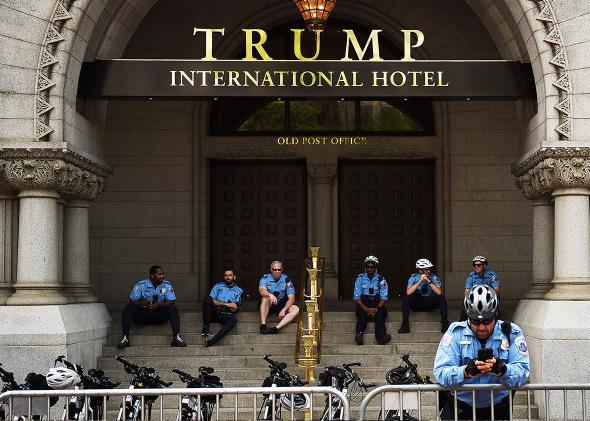Shortly before taking office, Donald Trump attempted to explain how he would, in his lawyer’s words, “completely isolate” himself from the management of the Trump Organization. The plan was all show and no substance, and did almost nothing to address the serious problems posed by Trump keeping his stake in the for-profit company that bears his name. But among the many empty promises, one flourish stood out: His vow to donate “all profits” derived from foreign governments doing business at his hotels to the U.S. Treasury. “This way,” his lawyer claimed at the prop-filled press conference, “it is the American people who will profit.”
As I explained then, there were several glaring holes in that pledge. You can define profits a number of different ways, which creates enough semantic space for Trump to pretend to drive a truck through. The Trump Organization—and by extension Donald J. Trump—would also still benefit mightily from the free buzz created by foreign governments holding lavish affairs at its establishments, and from foreign dignitaries drinking at its high-priced hotel bars and dining at his expensive hotel restaurants (as they have done frequently since Trump’s Electoral College victory). Furthermore, hotel fees are only a drop in the gold-plated bucket of the money Trump receives from foreign governments and the companies they control. The far bigger problem is the millions he receives in the form of things like rent from state-controlled entities, such as the Industrial & Commercial Bank of China, which will need to renegotiate its lease at Trump Tower during Trump’s first term.
As empty as Trump’s donation promise was, though, it is even more of a sham than it first appeared. According to a document provided to the House Oversight Committee earlier this month, the Trump Organization can’t be bothered to keep a good-faith accounting of the profits its hotels make off foreign governments. Or, as the company puts it in the glossy pamphlet it gave to the committee detailing its plans to separate out such profits, it would be “impractical” to keep tabs on each and every dollar it makes from those with ties to foreign governments. From the document, which was made public Wednesday by Elijah Cummings, the top Democrat on the oversight panel:
To fully and completely identify all patronage at our Properties by customer type is impractical in the service industry and putting forth a policy that requires all guests to identify themselves would impede upon personal privacy and diminish the guest experience of our brand. It is not the intention nor design of this policy for our Properties to attempt to identify individual travels who have not specifically identified themselves as being a representative of a foreign government entity on foreign government business.
Instead, the businesses will only track transactions where it is obvious that the bill is being paid directly by a foreign government, a foreign political party, a sovereign wealth fund, or a member of a royal family. The pamphlet makes clear Trump execs know full well that won’t flag all the relevant foreign cash. “Some may operate through state-owned and state-controlled entities in industries such as aerospace and defense, banking, finance, healthcare, energy and others, which may not be reasonably identifiable as foreign government entities, and therefore may not be included in our calculation of profit to be donated,” the document reads.
Translation: Trump hotels will leave it up to their paying customers to declare whether they are there on foreign-government business. The absurdity of letting foreign actors self-police is easy to see: If the goal is to grease the wheels with President Trump via his bank account, all a foreign official would need to do is keep his mouth shut at the check-in desk while he pays with a company credit card—even if that company is controlled by a foreign government. It’s no wonder this loophole didn’t earn a mention when Trump first unveiled his ethics plan in January, or when the Trump Organization disclosed in March that it wouldn’t be making its first Treasury donation until 2018 at the earliest.
So, does any of this impact Trump’s defense against charges that he is violating the U.S. Constitution’s Emoluments Clause? While it puts the lie to another one of Trump’s false displays of benevolence, it doesn’t actually change the legal defense he’s offered to date. Team Trump maintains that hotel fees—along with other money his companies make from doing business with foreign governments—don’t amount to emoluments, but instead are simply value-for-value exchanges. In that convenient constitutional reading, the donations in question are simply voluntary. Many legal scholars and ethics experts read the Emoluments Clause differently—and a group of them are currently challenging the president in court—but if the courts were to ultimately side with Trump on the matter—or to decide that the only constitutional remedy is political—then the fact he isn’t donating as much as he should will have little relevance. Conversely, if the courts were to decide any Trump business with foreign governments is an emoluments violation, then the president is in trouble regardless of how much or little effort his hotels put into their bookkeeping.
In the meantime, though, we have yet one more piece of evidence suggesting that, when it comes to his family business, there’s no reason to believe Trump has any plans to even live up to his side of a bargain he negotiated with himself.
Know anything about a potential conflict of interest in the Trump administration? DM Josh Voorhees on Twitter or email him at josh.voorhees@slate.com.
